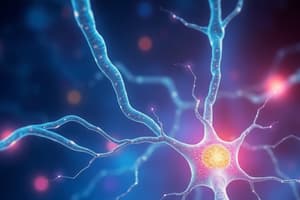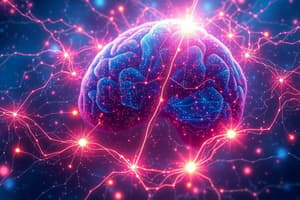Podcast
Questions and Answers
What is the term used to describe the process when stimulation of an axon results in a more negative membrane potential?
What is the term used to describe the process when stimulation of an axon results in a more negative membrane potential?
- Depolarization
- Resting potential
- Repolarization
- Hyperpolarization (correct)
Which ion channels open first when an action potential is initiated?
Which ion channels open first when an action potential is initiated?
- Potassium
- Chloride
- Calcium
- Sodium (correct)
Which brain region is associated with the production of dopamine?
Which brain region is associated with the production of dopamine?
- Substantia nigra (correct)
- Hippocampus
- Basal ganglia
- Amygdala
What happens to postsynaptic potentials (PSPs) as time passes?
What happens to postsynaptic potentials (PSPs) as time passes?
What is an agonist in the context of neurotransmitter function?
What is an agonist in the context of neurotransmitter function?
What happens to photoreceptors in the dark?
What happens to photoreceptors in the dark?
Which ions are in greater concentration inside a neuron when it is at rest?
Which ions are in greater concentration inside a neuron when it is at rest?
What is NOT a characteristic of an action potential?
What is NOT a characteristic of an action potential?
What signal is generated when hair cells in the ear move toward the tallest cilium?
What signal is generated when hair cells in the ear move toward the tallest cilium?
What is the primary function of the choroid plexus?
What is the primary function of the choroid plexus?
Which cells carry information from the inner ear to the brain?
Which cells carry information from the inner ear to the brain?
What is the primary function of hair cells in the Organ of Corti?
What is the primary function of hair cells in the Organ of Corti?
What occurs when cells containing halorhodopsin (NpHR) are exposed to yellow light?
What occurs when cells containing halorhodopsin (NpHR) are exposed to yellow light?
How does the auditory system encode loudness?
How does the auditory system encode loudness?
Which process converts immediate memories into long-term memories?
Which process converts immediate memories into long-term memories?
In the retina, what is responsible for creating the blind spot?
In the retina, what is responsible for creating the blind spot?
What memory ability was preserved in patient H.M. post-surgery?
What memory ability was preserved in patient H.M. post-surgery?
Which brain area is primarily associated with studying long-term potentiation (LTP)?
Which brain area is primarily associated with studying long-term potentiation (LTP)?
What triggers the amygdala's response when viewing emotional faces?
What triggers the amygdala's response when viewing emotional faces?
What is the function of the conditioned stimulus during auditory fear conditioning in rats?
What is the function of the conditioned stimulus during auditory fear conditioning in rats?
Which molecule is known to act as a retrograde messenger to foster presynaptic changes after LTP?
Which molecule is known to act as a retrograde messenger to foster presynaptic changes after LTP?
How does instructed fear learning differ from other types of fear learning?
How does instructed fear learning differ from other types of fear learning?
What does Hebb's rule state about neuronal activity?
What does Hebb's rule state about neuronal activity?
Which factor is associated with the relationship between the hippocampus and depression?
Which factor is associated with the relationship between the hippocampus and depression?
What happens to animals in the sham group during stereotaxic surgery?
What happens to animals in the sham group during stereotaxic surgery?
What is the primary function of cerebrospinal fluid?
What is the primary function of cerebrospinal fluid?
Which neurotransmitter is synthesized from tryptophan?
Which neurotransmitter is synthesized from tryptophan?
What structure connects the two hemispheres of the brain?
What structure connects the two hemispheres of the brain?
Where in the retina are the most photoreceptor cones located?
Where in the retina are the most photoreceptor cones located?
What part of the neuron is stained with a Nissl stain?
What part of the neuron is stained with a Nissl stain?
What is the role of the pituitary gland in the body?
What is the role of the pituitary gland in the body?
What term describes the raised parts of the cerebral cortex?
What term describes the raised parts of the cerebral cortex?
What effect does chronic stress have on the hippocampus?
What effect does chronic stress have on the hippocampus?
What part of the brain secretes adrenocorticotropic hormone (ACTH) during the stress response?
What part of the brain secretes adrenocorticotropic hormone (ACTH) during the stress response?
How does high maternal care influence stress reactivity in offspring?
How does high maternal care influence stress reactivity in offspring?
What is the effect of good maternal care on GABAergic tone in the amygdala?
What is the effect of good maternal care on GABAergic tone in the amygdala?
What happens to neural function during chronic stress due to elevated glucocorticoids?
What happens to neural function during chronic stress due to elevated glucocorticoids?
What does NOT occur after calcium activates CaMKII in dendritic spines?
What does NOT occur after calcium activates CaMKII in dendritic spines?
What is the relationship between glutamate and NMDA receptor activation for LTP induction?
What is the relationship between glutamate and NMDA receptor activation for LTP induction?
How does chronic glucocorticoid release affect muscle tissue and the brain?
How does chronic glucocorticoid release affect muscle tissue and the brain?
Flashcards
What are the raphe nuclei?
What are the raphe nuclei?
The raphe nuclei are a group of brainstem nuclei that produce and release serotonin.
What are two key features of the somatosensory cortex?
What are two key features of the somatosensory cortex?
Different parts of the somatosensory cortex receive input from different parts of the body. The amount of cortex dedicated to each body part is proportional to the sensitivity of that region.
What is the corpus callosum?
What is the corpus callosum?
The corpus callosum is a thick band of nerve fibers that connects the two hemispheres of the brain, allowing them to communicate.
What is cerebrospinal fluid and why is it important?
What is cerebrospinal fluid and why is it important?
Signup and view all the flashcards
Where does the brain produce norepinephrine?
Where does the brain produce norepinephrine?
Signup and view all the flashcards
What brain region is implicated in Parkinson's disease?
What brain region is implicated in Parkinson's disease?
Signup and view all the flashcards
What does a Nissi stain highlight in neurons?
What does a Nissi stain highlight in neurons?
Signup and view all the flashcards
Why are lateralization effects hard to observe in healthy people?
Why are lateralization effects hard to observe in healthy people?
Signup and view all the flashcards
Photoreceptors in the dark
Photoreceptors in the dark
Signup and view all the flashcards
Hair cell movement and tension
Hair cell movement and tension
Signup and view all the flashcards
Auditory nerve
Auditory nerve
Signup and view all the flashcards
Organ of Corti
Organ of Corti
Signup and view all the flashcards
Channelrhodopsin (ChR2)
Channelrhodopsin (ChR2)
Signup and view all the flashcards
Action potential in the retina
Action potential in the retina
Signup and view all the flashcards
Halorhodopsin (NpHR)
Halorhodopsin (NpHR)
Signup and view all the flashcards
Sensory transduction in the ear
Sensory transduction in the ear
Signup and view all the flashcards
Hyperpolarization
Hyperpolarization
Signup and view all the flashcards
Sodium channels open first
Sodium channels open first
Signup and view all the flashcards
Dopamine producing region
Dopamine producing region
Signup and view all the flashcards
Chloride influx and hyperpolarization
Chloride influx and hyperpolarization
Signup and view all the flashcards
Postsynaptic potential (PSP) characteristics
Postsynaptic potential (PSP) characteristics
Signup and view all the flashcards
Agonist function
Agonist function
Signup and view all the flashcards
Sodium-potassium pump function
Sodium-potassium pump function
Signup and view all the flashcards
Threshold of excitation
Threshold of excitation
Signup and view all the flashcards
Neural integration
Neural integration
Signup and view all the flashcards
Cholinergic cell bodies
Cholinergic cell bodies
Signup and view all the flashcards
How is LTP measured?
How is LTP measured?
Signup and view all the flashcards
What kind of memory was spared in patient H.M.?
What kind of memory was spared in patient H.M.?
Signup and view all the flashcards
Social fear learning example
Social fear learning example
Signup and view all the flashcards
What happens when a fearful face is presented for 30 milliseconds?
What happens when a fearful face is presented for 30 milliseconds?
Signup and view all the flashcards
Where is LTP primarily studied?
Where is LTP primarily studied?
Signup and view all the flashcards
How is frequency encoded in the auditory system?
How is frequency encoded in the auditory system?
Signup and view all the flashcards
Instructed fear learning example
Instructed fear learning example
Signup and view all the flashcards
What is TRUE of a tetanus protocol?
What is TRUE of a tetanus protocol?
Signup and view all the flashcards
What does chronic stress do to the hippocampus?
What does chronic stress do to the hippocampus?
Signup and view all the flashcards
Where is ACTH released during stress?
Where is ACTH released during stress?
Signup and view all the flashcards
What kind of maternal behavior is linked to lower stress in offspring?
What kind of maternal behavior is linked to lower stress in offspring?
Signup and view all the flashcards
How does maternal care affect GABAergic tone in the amygdala?
How does maternal care affect GABAergic tone in the amygdala?
Signup and view all the flashcards
How does chronic stress impact spatial memory?
How does chronic stress impact spatial memory?
Signup and view all the flashcards
What happens when a pup from a low licking-grooming mom is raised by a high licking-grooming mom?
What happens when a pup from a low licking-grooming mom is raised by a high licking-grooming mom?
Signup and view all the flashcards
What effect does chronic stress have on the amygdala?
What effect does chronic stress have on the amygdala?
Signup and view all the flashcards
What are the harmful effects of chronic glucocorticoid release?
What are the harmful effects of chronic glucocorticoid release?
Signup and view all the flashcards
Study Notes
Neurobiology Study Notes
- Hyperpolarization: Stimulation of an axon makes the membrane potential more negative.
- Action Potential Initiation: Sodium ion channels open first when an action potential is initiated.
- Dopamine Production: The substantia nigra brain region contains cells that produce dopamine.
- Hyperpolarization Ions: Chloride ions influx leads to hyperpolarization.
- Postsynaptic Potentials (PSPs): PSP size is directly proportional to neurotransmitter release and degrades over time.
- Neurotransmitter Agonist/Antagonist: A drug that blocks neurotransmitter reuptake or postsynaptic receptors is an agonist, while a drug that prevents storage of neurotransmitters or release is also an agonist.
- Sodium-Potassium Pump: It does NOT pump sodium into the cell and potassium out, instead it pumps sodium out and potassium in; this is important for maintaining resting potential.
- Threshold of Excitation: The voltage sensitivity of sodium ion channels determines the threshold of excitation.
- Neural Integration Location: Neural integration takes place at the axon hillock.
- Cholinergic Cell Bodies: The dorsolateral pons, medial septum, and basal forebrain contain cholinergic cell bodies, or all of the above.
- Depolarization: Stimulation of an axon, making the membrane potential more positive.
- Neurotransmitter at AMPA Receptors: Glutamate binds to AMPA receptors.
- EPSP: If the binding of a neurotransmitter causes positively charged ions to enter a cell, this is an EPSP.
- Neuron Signal Reception: Dendrites typically receive incoming signals from other neurons.
- Resting Potential Sodium: The force of diffusion out of the cell and active pumping by the sodium-potassium pump maintain the lower sodium concentration inside the cell.
- Antagonist: A drug or substance that binds to a receptor and inhibits the action of a neurotransmitter is a direct antagonist.
- Postsynaptic Membrane Effects (GABA): GABA binding to its receptor results in IPSPS (inhibitory postsynaptic potentials).
- Intracellular Ions: Potassium (K+) ions are more concentrated inside the cell than outside the cell, at rest.
- Action Potential Properties: An action potential does not degrade over time.
- Cerebrospinal Fluid Function: The choroid plexus makes cerebrospinal fluid; among other things, it reduces the net weight of the brain and plays a role in shock absorption.
- Non-Monoamine: Certain substances/molecules are not classified as monoamines. For example, the question included one that was NOT a monoamine.
- Serotonin Production Location: The raphe nuclei contain neurons that produce serotonin.
- Norepinephrine Production Location: The locus coeruleus contains neurons that produce norepinephrine.
- Parkinson's Disease Impairment Region: Basal ganglia regions have been implicated in Parkinson's disease symptoms.
- Nissl Stain Targets: Cell bodies are stained by Nissl stains.
- Brain Hemisphere Connectivity: The corpus callosum connects the two hemispheres.
- Ventricular Content: Cerebrospinal fluid (CSF) is within the ventricles.
- Brain Directions: Specific terms defining directions relative to the neuraxis of the brain are provided.
- Precursor of Serotonin: Tryptophan is a precursor to serotonin.
- Visual Transduction Location: Visual transduction takes place in the retina.
- Photoreceptor State (Dark): Photoreceptors are depolarized and continually release neurotransmitters when it is dark.
- Hair Cell Movement and Neurotransmitter Release: When hair cells move towards the tallest cilium, tension increases on tip links, leading to the opening of ion channels and neurotransmitter (e.g., glutamate) release.
- Inner Ear Sensory Transduction: Sensory transduction in the inner ear occurs in the organ of Corti.
- Neurotransmitter Response to Light: When ChR2, a channelrhodopsin-containing virus, is used optogenetically and cells are illuminated by blue light they become excited.
- Retinal Action Potentials: Ganglion cells in the retina produce action potentials.
- Optic Nerve Structure: Dendrites from retinal ganglion cells make up the optic nerve.
- Sensory Transduction: Sensory transduction converts an external stimulus into a change in receptor membrane potential.
- Photoreceptor State (Light): Photoreceptors are hyperpolarized and release less neurotransmitter in response to light.
- Loudness Encoding in the Auditory System: Firing rate of auditory nerves is one way the auditory system encodes sound loudness.
- Memory Formation: Consolidation is a process where immediate memories are transformed into long-term memories.
- Conditioned Fear Response: Pairing a conditioned stimulus (CS) with an unconditioned stimulus (US) leads to the conditioned response (CR), to predict a subsequent shock or aversive event.
- Types of Learning: Learning that a stimulus predicts an aversive event by watching another experience the event is an example of social fear learning.
- Hippocampus and Depression: The hippocampus tends to be smaller in individuals with depression.
- Stress Response Hormones: The paraventricular nucleus of the hypothalamus (PVN) secretes corticotropin-releasing hormone (CRH), a hormone involved in the stress response. Adrenal cortex releases glucocorticoids.
Memory and Learning
- Learning and the Hippocampus: The relationship between the hippocampus and memory and learning are mentioned.
- Memory Encoding (LTP): Specific processes of LTP induction are studied, including glutamate binding to NMDA receptors, strong depolarization removing Mg block, and the role of nitric oxide in enhancing neurotransmitter release.
- Emotional Responses: Amygdala and responses to faces(fearful more so than happy faces)
- Hebb's Rule: "Cells that fire together, wire together."
Neurobiology and Behavioral Research
- Maternal Care Effects: High licking-grooming maternal care increases GABAergic tone in the amygdala; prolonged glucocorticoid elevation during chronic stress may lead to spatial reasoning impairment.
- Monkey Study (Coplan): Monkeys raised in unpredictable environments exhibited stronger stress responses compared to monkeys in stable or predictable environments.
- Excessive Glutamate: Excessive glutamate can lead to neuronal death.
Studying That Suits You
Use AI to generate personalized quizzes and flashcards to suit your learning preferences.


